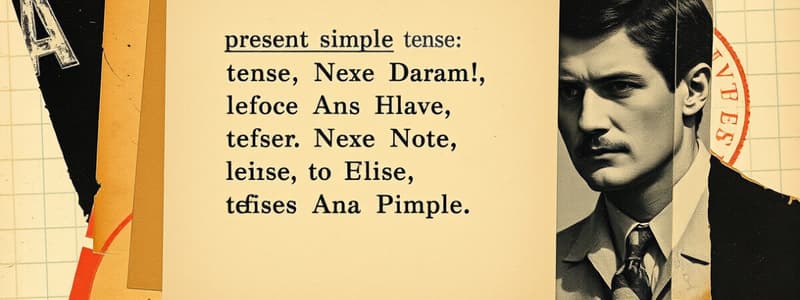Podcast
Questions and Answers
What is the correct structure for forming a negative sentence in the present simple tense?
What is the correct structure for forming a negative sentence in the present simple tense?
- Subject + do/does + base form of the verb.
- Subject + base form of the verb + not.
- Subject + do/does + not + base form of the verb. (correct)
- Do/Does + subject + not + base form of the verb.
The question word 'Why' can start an interrogative sentence in the present simple tense.
The question word 'Why' can start an interrogative sentence in the present simple tense.
True (A)
How do you form a present simple interrogative question with 'he'?
How do you form a present simple interrogative question with 'he'?
Does he + base form of the verb?
I ____ (not, like) coffee.
I ____ (not, like) coffee.
Match the following subjects with their appropriate negative form:
Match the following subjects with their appropriate negative form:
Which sentence correctly describes a routine action?
Which sentence correctly describes a routine action?
Flashcards are hidden until you start studying
Study Notes
Present Simple Tense
Interrogative Forms
- Structure: Do/Does + subject + base form of the verb?
- Example: Do you like coffee? / Does she play tennis?
- Usage:
- "Do" is used with I, you, we, they.
- "Does" is used with he, she, it.
- Question Words:
- Can start with question words (What, Where, When, Why, How).
- Example: What do you do? / Where does he work?
Negative Sentences
- Structure: Subject + do/does not + base form of the verb.
- Example: I do not (don't) like coffee. / She does not (doesn't) play tennis.
- Usage:
- "Don't" is used with I, you, we, they.
- "Doesn't" is used with he, she, it.
Uses In Daily Conversations
- Routine Actions: Describing habitual actions or daily routines.
- Example: I go to the gym every day.
- Facts and General Truths: Stating facts or universal truths.
- Example: Water boils at 100 degrees Celsius.
- Scheduled Events: Talking about scheduled events or timetables.
- Example: The train leaves at 6 PM.
Form And Structure
- Affirmative Form: Subject + base form of the verb (with appropriate endings for third-person singular).
- Example: He works on Mondays.
- Third-person Singular: Add "s" or "es" to the base form for he, she, it.
- Examples:
- "He runs." (add "s")
- "She watches." (add "es" due to ending with "ch")
- Examples:
- Base Form for Other Subjects: No change in the verb.
- Example: I play, They read.
Interrogative Forms
- Structure: Form questions using "Do" or "Does" followed by the subject and base verb.
- Example questions include "Do you like coffee?" and "Does she play tennis?"
- "Do" applies to subjects: I, you, we, they, while "Does" is used for: he, she, it.
- Questions can begin with words like What, Where, When, Why, and How. Examples: "What do you do?" "Where does he work?"
Negative Sentences
- Structure: Make negative sentences by placing the subject followed by "do/does not" and the base form of the verb.
- Examples: "I do not (don't) like coffee." and "She does not (doesn't) play tennis."
- "Don't" is used with I, you, we, they, whereas "Doesn't" is for he, she, it.
Uses in Daily Conversations
- Describes routine actions and habitual behaviors, such as "I go to the gym every day."
- States facts or universal truths, e.g., "Water boils at 100 degrees Celsius."
- Refers to scheduled events or timetables, as in "The train leaves at 6 PM."
Form and Structure
- Affirmative sentences formed by the subject and the base form of the verb, with third-person singular requiring specific endings.
- In third-person singular, add "s" or "es" to the verb: "He works" (add "s") and "She watches" (add "es" due to "ch").
- For subjects I, you, we, they, the base form remains unchanged: "I play," "They read."
Studying That Suits You
Use AI to generate personalized quizzes and flashcards to suit your learning preferences.




